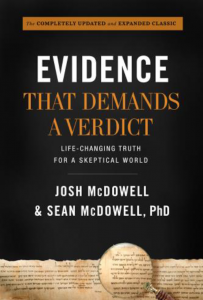Show me the historical evidence!
Many people assert that society is better off without religion, viewing it as degrading and harmful to one’s mental health and happiness.
To atheists, belief in the supernatural is absurd.

Christopher Hitchens once asserted that religious belief requires faith, but atheism doesn’t — because it relies primarily on the empirical evidence of science.
Ironically, Albert Einstein, arguably the most influential scientist of the 20th century, stated that the most incomprehensible thing about the world is that it is incomprehensible.
Einstein understood a basic *truth* about science: that it relies on certain philosophical assumptions about the natural world — including the existence of a real external world that is orderly and knowable, and the trustworthiness of our minds to grasp that world. Science cannot proceed apart from these assumptions.
Charles Darwin himself asserted, “The horrid doubt always arises whether the convictions of man’s mind, which has been developed from the mind of lower animals, are of any value or at all trustworthy.”
Atheists place enormous trust in their personal powers of reason. Yet their worldview undermines the basis for such confidence. If Darwinian evolution is true, our cognitive faculties are the result of an unguided, irrational process, which should make us distrust them.
Questions to Ponder
- Does atheism really require no faith?
- Are you aware of the biases you bring to religion?
- What do you believe that you haven’t critically questioned?
Many people assume that all faiths are basically talking about the same thing.
“Aren’t all the different religious groups — Christians, Muslims, Mormons, Buddhists, etc. — experiencing the same God, just explaining it in different ways, so they’re all true?”

The facts don’t support this statement. For instance, Christianity and Islam differ dramatically in their theology.
The Jesus of Christianity died to offer every person the free gift of salvation. You don’t have to be “good enough” to get into heaven. We call this gift God’s “undeserved grace” toward us.
The Jesus of Islam, on the other hand, is not the Son of God and did not die for the sins of the world. So Muslims must earn their way into paradise, in part by their righteous deeds.
Even if we compare groups that profess to be Christian — Mormonism and Jehovah’s Witnesses, for example — we can see where they’ve significantly reduced Jesus’ authority and supernatural power. A pear can call itself an apple, but that doesn’t change the fact that it’s actually a pear.
Even Buddhism and Hinduism have significant doctrinal differences from each other and Christianity.
So all religions are not the same. A person can choose to make this claim, but their claim is neither factual nor true.
What sets Christianity apart from ALL other religions is that Jesus died, sacrificially, so that every single person can choose to be in personal relationship with the Creator of the universe. Jesus’ selfless sacrifice makes it possible.
Questions to Ponder
- What’s attractive to you about the “all religions are the same” idea?
- How do you view religion, and your need of it?
- God wants to be in a personal relationship with you. Does this boggle your mind?
Archaeology is the study of mankind’s debris that has survived over time.
Can archeology prove God’s existence?

Most modern scientific methods that recover the remains of the past do so to better understand ancient people and their practices. The Middle East is one area of rich archaeological excavations.
Archaeology, without history, is meaningless. Archaeology can tell us a sequence of cultural development, but it can’t give us exact chronology. It is history that supplies the chronology; the events, people, places.
So it is beyond the realm of archaeology to prove that the Bible is the Word of God. At present, archaeology is an improving science, with limited available data.
But even with its limitations, it has been helpful in illustrating that many biblical passages are, indeed, historically accurate. And this is important, because Christianity is a historical faith that claims its records of supernatural events really happened.
If the authors of the Bible have been accurate in their accounts of things that transpired, then it logically follows that the miracles they mention, including seeing Jesus die and then resurrect, needn’t be considered farfetched.
It’s important that the source is trustworthy, to then believe what the source says. Archeology has helped us to see the Bible authors, including Jesus’ disciples, as trustworthy.
Questions to Ponder
- Do you need to see artifacts to believe in the past?
- Does knowing the Bible has proven trustworthy matter?
- What proof are you wanting to believe in the Bible?
Josh McDowell, back when he was an angry skeptic, asserted, “Christianity is for the weaklings; it’s just a crutch.”
Karl Marx opined that “Religion is the opiate of the masses.”

The fact of the matter is that we ALL need support to get by in this world. Deep down we’re all in search of something to give us strength and purpose.
So does humanity need Jesus? Or are there adequate substitutes, as skeptics and atheists suggest?
Perhaps money, status, power, “toys,” or relationships? Or maybe it’s just cold, hard facts, as long as they exclude the possibility of the supernatural or an intelligent Creator?
If money, fame, and power worked as foundations, then rich, powerful, famous people would all be joyful and fulfilled. But they’re not.
Jesus provides us with the securest foundation we’ll ever know. Because once we understand our value to Him, and the depth of His love for us, nothing and no one can take this assurance from us.
As a light bulb was created to give light when inserted into the socket, our personal relationship with Jesus empowers us.
Life is hard, in part, because it’s meant to help us mature us into individuals God can use to do good works in the world. Best crutch, ever!
Questions to Ponder
- What “crutches” are in your life now?
- If God is a “crutch,” is that a bad thing?
- Are you confused as to how God “empowers” you?
Many make the assumption that the evil in our world disproves God’s existence.
Or if He does exist, then God must be an uncaring jerk because He doesn’t stop it.

Even writers in the Bible complained about pain and evil. Sample verses:
“Evils have encompassed me without number” (Psalm 40:12).
“Why is my pain unceasing, my wound incurable, refusing to be healed?” (Jeremiah 15:18).
“The whole creation has been groaning in travail together until now” (Romans 8:22).
The Bible tells us plainly that God didn’t create the world in the state as we experience it. Evil became part of our world because humanity chose it.
When Eve chose to bite into the apple, she was saying, “I don’t trust God as much I trust this serpent who is telling me that God is withholding good stuff from me.”
Some then ask: “But if God is so quick to forgive sin, as you Christians say, why did He make Adam and Eve leave paradise. Why so harsh?”
Perhaps because the Bible story of Adam and Eve doesn’t tell us that they were remorseful. Or that they asked for forgiveness. What it does tell us is that they quickly cast blame elsewhere.
Sounds a lot like how we live our lives now, right?
God is holy, not evil. And He does not create evil. You and I do that on our own. But God is willing to forgive our rebellion and sin if we ask — and even created the solution. He took human form, to willingly die a horrific death at our hands. And every drop of His blood flowed with ceaseless love.
We have no right to judge God. As Dorothy Sayers notes:
“For whatever reason God chose to make man as he is — limited and suffering and subject to sorrows and death — He had the honesty and the courage to take His own medicine. Whatever game He is playing with His creation, He has kept His own rules and played fair. He can exact nothing from man that He has not exacted from Himself. He has Himself gone through the whole of human experience, from the trivial irritations of family life and the cramping restrictions of hard work and lack of money to the worst horrors of pain and humiliation, defeat, despair and death. When He was a man, He played the man. He was born in poverty and died in disgrace and thought it well worthwhile.”
The Bible flat out tells us that we often WON’T understand God’s motivations and actions. But we can trust in God’s ceaseless love. And some day we WILL understand it all.
And we can confidently muddle through, knowing that God is for us, and with us, encouraged in our knowledge that the evil in this world is temporary.
God promises that when we choose to humbly bow to His authority, the joy we’ll get to experience in eternal life in His presence will blow our minds!
Questions to Ponder
- Are you judging God for evil in the world?
- Can you view yourself as a co-creator of the world’s evil?
- Does hearing that God paid so dearly to be in relationship with you matter to you?
This often-asked question contains the assumption that the Bible is filled with obvious discrepancies that make it impossible to believe its divine origin.
It’s a popular idea to main that the Bible disagrees with itself. It is very easy to accuse the Bible of inaccuracies, but it’s quite another matter to prove it.

Some want to employ a different set of rules when it comes to examining the Bible. But it’s only fair to use the same standard used for non-Christian documents.
So, what constitutes a contradiction?
The law of non-contradiction, the basis of all logical thinking, states that a thing cannot be both a and non-a at the same time. In other words, it cannot be both raining and not raining at the same time. So someone has to demonstrate a violation of this principle when examining the Bible, to prove a contradiction.
For example, if the Bible were to have said that Jesus died by crucifixion at Jerusalem AND at Nazareth, that would be a provable error.
When evaluating possible contradictions, we must keep in mind that two statements may differ, yet still not be contradictory. Some fail to make the distinction between “contradiction” and “difference.”
As an example, let’s consider the Bible story of the blind men at Jericho. The disciple Matthew relates that two blind men met Jesus. But in their Gospels, Mark and Luke mention only one blind man. But these statements don’t deny the other. Accurate study shows that they are complementary.
Consider this: Suppose you were talking to the mayor of your city and the chief of police at city hall. Later, you see your friend, Jim, and tell him you talked to the mayor. An hour later, you see your friend, John, and tell him you talked to both the mayor and the chief of police.
When your friends compare notes, there is a seeming contradiction. But you would have had to tell Jim that you talked only to the mayor, to have a contradiction. The statements you made to Jim and John were different, yes, but not contradictory.
Stories in the Bible sometimes evidence this pattern. Many are quick to call out supposed errors that are not, in fact, actually errors.
Just one example: In the Book of Judges we learn of the death of Sisera, at the hands of Jael. The question arises as to whether Jael struck Sisera as he slept, or as he drank milk. Clearly, she couldn’t have done both. A closer reading of Judges 5:25–27 reveals that it is not stated that Sisera was drinking milk at the moment of impact, and the potential discrepancy disappears.
Sometimes two passages appear to be contradictory simply because the translation in question is not as accurate as it could be. Knowledge of Greek and Hebrew can often quickly clear up the confusion.
An example is the details around Paul’s conversion, as recorded in the Book of Acts. Acts 9:7 states, “The men which journeyed with him stood speechless, hearing a voice, but seeing no man.” But Acts 22:9 reads, “And they that were with me saw indeed the light, and were afraid; but they heard not the voice of Him that spake to me.”
These statements do seem contradictory. Did Paul’s companions hear a voice or not? Again, mastery of Greek clears this up. W. F. Arndt, a Greek scholar, explains:
“The construction of the verb ‘to hear’ (akouo) is not the same in both accounts. In Acts 9:7 it is used with the genitive, in Acts 22:9 with the accusative. The construction with the genitive simply expresses that something is being heard or that certain sounds reach the ear; nothing is indicated as to whether a person understands what he hears or not. The construction with the accusative, however, describes a hearing which includes mental apprehension of the message spoken. From this it becomes evident that the two passages are not contradictory.”
Acts 22:9 does not deny that the associates of Paul heard certain sounds; it simply declares that they did not hear in such a way as to understand what was being said.
Lastly, let’s remember that sometimes it’s our own inadequate knowledge of circumstances — our own ignorance — that causes us to believe we’ve found an error. We run into this issue often in our own lives, right?
Questions to Ponder
- Does human error make the Bible unreliable?
- Would you hold that same standard for your own writing?
- Are you willing to forgo your biases and study Scripture with an open mind?
Josh McDowell notes that when speaking to a philosophy or history class, someone in the audience often tossed out this challenge: “Can you prove Jesus’ resurrection scientifically?”
“I usually said, ‘Well, no, I’m not a scientist,’” shares Josh. “Then I heard the class chuckling and the students say things like, ‘Then don’t talk to me about it,’ or ‘So I’m supposed to take it on faith?’ Their response made ME chuckle!”

Science is great when it stays in its lane. But it oversteps its authority when it chooses to make claims it hasn’t (and can’t) actually prove. Like whether Jesus resurrected.
The students were missing this key point: Science can only prove what it can repeat in a controlled environment. Yet the scientific community is guilty of asserting theory as fact.
When studying historical events or people, we can’t actually turn to science. But we CAN use a tool called legal-historical proof, which looks at available evidence to discern answers.
Legal-historical proof incorporates three sources: oral testimony, written testimony, and exhibits, which could be any physical item. Using this tool, an inquiry into whether you watched TV or ate lunch might begin with these questions: Was someone with you? Did an eyewitness observe you? Is there a restaurant receipt? What’s in your trash can?
= Did George Washington chop down a cherry tree? Science can’t say.
= Was Martin Luther King, Jr., a civil rights leader? Science can’t say.
= Did Jesus live, die, and resurrect? Science can’t say.
And yet the scientific community is quick to suggest that the miraculous doesn’t happen, because their facts can’t prove it.
What a silly … if not ignorant … claim to make.
Questions to Ponder
- Do you believe only what science proves?
- Okay, then what about intangibles, like love?
- So when something unbelievable happens to you, do you call it “luck”?



